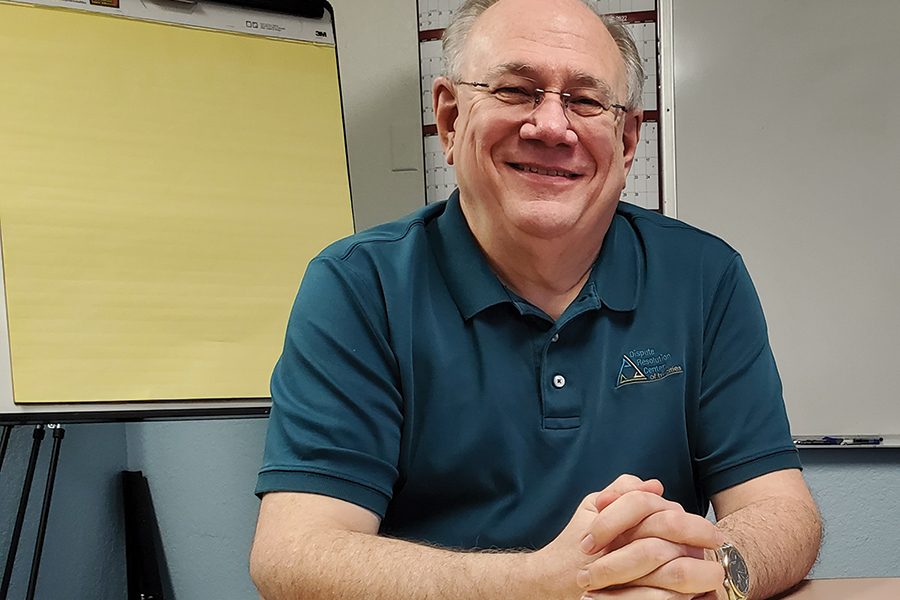
Home » Trained mediators help to find common ground in workplace and beyond
Trained mediators help to find common ground in workplace and beyond

January 11, 2023
It can be challenging to work out differences.
Sometimes it’s hard to see another’s viewpoint.
Sometimes it’s hard to look within.
When disputes escalate, they can bog down the legal system.
That’s why the Dispute Resolution Center of Tri-Cities (DRC) has been working to resolve disagreements since 1999.
The support of trained, unbiased mediators can help people work out their issues, whether it’s discord in the workplace, a business-to-business conflict, a customer having an issue with a business, or a court-referred case involving a divorce, eviction, lawsuit or other small claim.
The Tri-City center has a 75% success rate in resolving disputes.
“Over and over again, studies have shown that people are more likely to abide by agreements made in mediation than court-ordered resolutions,” said Executive Director Paul Shelp. “People are beginning to see it’s to their advantage to settle things out of court.”
The Tri-Cities center is part of a network of 21 not-for-profit centers across the state that offer professional mediation services.
All agreements reached in mediation are legal and binding.
“People only have to experience (this) one time to realize it’s possible. They listen to each other, not just yell and hurl accusations. Instead, they do it in such a way that retains relationships. They speak to each other as human beings, which is totally different than if someone is hauled to court.
“We live in a very litigious society. The return on investment of what is saved across the state every month and every year mediating instead of litigating is huge,” said Shelp, a trained mediator who has been with the center for 16 years.
Mediation services are provided by three main sources: attorneys, independent people in the private sector and DRC volunteers.
Because DRC mediators volunteer their time, it is able to provide services on an income-based sliding scale, with the cheapest being $50 for each three-hour session.
“It’s an access to justice kind of issue. People who don’t have money can’t hire attorneys yet can still have access to courts and those processes through mediation,” Shelp said.
Franklin and Benton county district courts both require mandatory mediation before a small claims case can go to trial. Mediation is mandatory in superior court for divorces.
“(Washington) is not an at-fault state … the question is who determines what’s fair and equitable? The court allows people to do that for themselves if they can do that on their own, or they can come to mediation to help them decide how they’re going to do their settlement,” Shelp said.
This takes pressure off the court system, saving time, money and hassle for the courts, as well as those involved.
Family mediation is what DRC of Tri-Cities handles most, with workplace conflicts coming in second.
“It’s not at all uncommon for someone to be referred in and not be sure why they’re here because they don’t think it’s going to do any good,” Shelp said.
Eviction epidemic
In the wake of Gov. Jay Inslee’s Covid-19 pandemic rent freeze and eviction moratorium, mediation has become even more important.
“All across the state, there are people months and years behind in rent,” Shelp said. “When this was all lifted, (legislators) realized that the courts were going to be flooded with eviction cases.”
The state Legislature passed Senate Bill 5160, the Eviction Resolution Pilot Program (ERPP), which stipulates that landlords must attempt to engage delinquent tenants in professional mediation before they can take them to court to evict them.
As a state-funded and -sponsored program, it costs neither landlords nor tenants anything to pursue mediation.
“It has been very successful from the standpoint of far less evictions in court than there would have been otherwise,” Shelp said.
It hasn’t been without controversy, however.
The program is set to end June 30.
Shelp speculated that based on its success, lawmakers may push to make it permanent, much like mandatory mediation for divorces and small claims.
Shelp said some attorneys locally and statewide have objected to the ERPP, claiming it deprives landlords of their constitutional rights.
The Tri-Cities’ DRC had successfully mediated over 3,000 cases since its establishment in 1999. Shelp said that for the month of December 2022, at press time, its case count was over 600.
Over the past 18 months, he said his office has worked on about 5,000 ERPP cases, though not all went to formal sit-down mediation.
He said he has three full-time staff members dedicated to ERPP – and it’s still not enough.
Hope is on the horizon because for this biennium the state Legislature has funded the $17 million the 21 DRCs collectively requested after years of operating on the margins with the help of donor assistance.
“We took the RCW and said, ‘If DRCs were fulfilling everything we’re supposed to do, what would it take to fund them and we came up with … $17 million per biennium,’ ” Shelp said.
This will help the Tri-City branch fund a larger staff to manage the burgeoning caseload, among other things.
Learning the skills
The DRC provides education and training to individuals, businesses and organizations to enhance the skills necessary for managing and resolving conflict.
The DRC follows a model that breaks down conflict into smaller bites that can be talked about one issue at a time.
“A lot of it comes down to communication. Most people think they are good communicators, but they aren’t. People get into patterns of communication in their relationships, and they know how to push each other’s buttons and that’s when communication shuts down,” Shelp said.
Mediators work in pairs to guide parties to keep their lines of communication open to resolution.
“We’re trying to help people find their underlying interests. If they can get their needs met, they will usually come to an agreement,” Shelp said, adding that sometimes resolutions are reached that go beyond what courts are legally allowed to prescribe. For example, barter arrangements for those who can’t afford the cost of damages owed.
“We don’t make the decisions for them; we are neutral,” Shelp said.
To become a DRC mediator, volunteers must complete a weeklong 40-hour basic training which prepares them to mediate any kind of conflict except divorce, i.e., neighbor-to-neighbor, workplace, business and other family conflicts.
At the conclusion, trainees must pass a final exam.
Trainees then become interns who observe a series of four real mediations, then actively mediate four cases alongside an experienced mediator.
A second 20-hour training course is available specifically for family mediation involving divorce.
Shelp said DRC volunteers come from all walks of life, with most having some professional background. They volunteer based on their availability.
He said some qualities common among them are being good listeners, able to remain neutral and not get drawn into other people’s conflicts and being comfortable with others getting emotional without becoming emotional.
“The folks that do this take it very seriously, are very devoted and dedicated to it. I have some volunteers that have been a part of this a long time, longer than I’ve been here. They really believe in the mission of the DRC to help people overcome and resolve differences outside of court. Our volunteers keep coming back because they see they are making a difference,” Shelp said.
Volunteer trainings are held every six months. The last session, scheduled for October 2022, was canceled due to no signups. The cost for the training is $350. Corporate attendees and attorneys must pay $650. The next session runs April 14, 15, 16, 29 and 30.
It’s not just prospective volunteers who sign up – human resources personnel, managers, supervisors and attorneys seeking continuing education credits – also may attend.
“As they come to understand better approaches to communication, in another setting, they can teach people on the job and in other settings that can help people resolve things more creatively and decisively,” Shelp said.
Educating employers about DRC’s services also opens the door to an alternative setting for employees to resolve conflicts they may not want aired to the greater workplace.
“In the future, I would love to see greater demand for trainings in workplaces to help minimize workplace conflict,” Shelp said.
Dispute Resolution Center of Tri-Cities: 5219 W. Clearwater Ave., Suite 11, Kennewick; 509-783-3325; drctc.org.
Local News Legal
KEYWORDS january 2023




